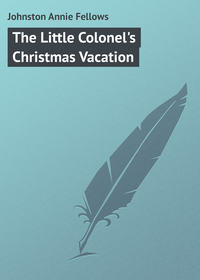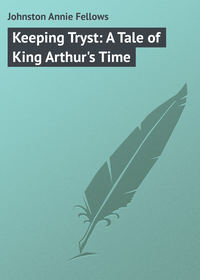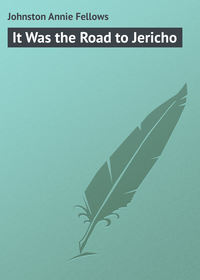
Aunt 'Liza's Hero, and Other Stories
Max had seldom heard his father speak so indignantly before, and looked at him in surprise as he gave a final fierce tug at the knot he had tied in the halter.
An hour later, when Doctor Morris called at the hospital, Max came running down-stairs with his eyes shining and an old battered canteen under his arm. "The captain gave it to me!" he said. "He has ever so many old relics in his chest, and there is a splendid story about each one. O papa, isn't he just the lovablest old man? He asked me to come often and bring some of the boys. He says he gets so lonesome!"
Nobody but the nurse knew how many times Max climbed the hospital stairs during the next two weeks. At first he always brought some boy with him to listen to the captain's stories, and carry away some relic as a treasured keepsake from the chest beside his bed; but later, the captain coughed too frequently to talk much. Then Max came alone, with bunches of hothouse flowers and little paper bags full of tempting fruit.
No matter when the boy came, he always found the captain busy with his carving. Day by day the old broomstick was slowly approaching a wonderful transformation. It would soon be turned into a long, slender chain, with each tiny, separate link perfectly fashioned. Sometimes, the nurse, not knowing that it was intended for her, and wondering at the old man's childish impatience to finish it, would gently insist on taking it out of his feverish fingers.
"Wait till to-morrow, when you are stronger," she would urge. He would then reluctantly give it up, but the thought of his work stayed with him. Even in his sleep his poor crippled hand bent as if to grasp it, and the left one feebly repeated the motions of wielding a knife.
"I have set my heart on having it done by Washington's Birthday," he whispered one day to Max. "Oh, if I can only hold out to finish it!" he added, as he sank back wearily. The nurse put the unfinished work aside, but the next morning he begged so imploringly for it that she had not the heart to refuse.
When the twenty-second of February came, Miss Clay's schoolroom was in gala dress for the occasion. She had been untiring in her efforts to make the ceremonies a success, but unconsciously to himself the old captain had done far more than she to arouse an interest in the programme.
Max came first with his old canteen, and repeated the story that the captain had told him, of the brave comrade who had carried it. Then one of the boys brought an old army cape of faded blue, and another a broken spur. Simple tales were told of love and loyalty that had never found their way into print, but they stirred the hearts of the hearers in the schoolroom with a pathetic tenderness for these unknown men who had been so bravely true.
Doctor Morris came into the room just in time to see the big fellow stand up who had declared the Father of his Country a "back number." He, too, had been with the captain, for he carried an old blood-stained, bullet-torn flag. He told its history so well that the tears came to his eyes in his earnestness, and the audience sympathized with the feeling and applauded him when he had finished.
"I see that we have a member of the school board with us," said Miss Clay, bowing to Doctor Morris. "We want to hear from him before we have our last song."
This was the opportunity the doctor was waiting for. He took a little package from his pocket. It was the captain's finished chain, from which hung a tiny anchor, beautifully carved and polished. "The nurse showed this to me a little while ago," he said, "and I asked her to let me bring it here for you to see."
The speech that followed was very much like the one he had made to Max in the sleigh – all afire with admiration for the man who, with crippled hand and with empty pockets, had turned his back on office, for love of country, for conscience' sake.
"But of all the noble lessons of this old man's life," he said, in conclusion, "none is more beautiful in spirit than this last act; this expression of gratitude to his faithful nurse. What is so commonplace, so soon forgotten as a bit of old broom-handle? But look at this." Again he held up the chain. "See the transforming power of a noble purpose! He has made of it an anchor, and fastened to her heart, with every link, the memory of his great gratitude.
"I don't want to preach," he went on, "but I must say that you young people, I fear, miss the spirit with which the nation should honour this day, if you do not see that the success of its celebration depends entirely on this same transforming power. A heartfelt gratitude to the heroes who won and kept our liberty can make beautiful the most commonplace act of commemoration."
Later, when the February afternoon was nearing twilight, there was a muffled sound of fife and drum on the hospital stairs. The many feet stepped lightly, but with a measured tramp, tramp as Miss Clay's school marched down the long corridor, four abreast.
The captain had been delirious at intervals all the afternoon. Now he opened his eyes with a puzzled expression, for the martial music made him forget his surroundings.
"It's just the young people from the school," explained the nurse, opening the door wider, that he might see the long rows of bright-faced boys and girls in the hall.
Max came in and took the old soldier's hand, stroking it affectionately while he talked. "They're going to sing 'Hail Columbia,' captain. You know how it goes:
"Let independence be our boast,Ever mindful what it cost,Ever grateful for the prize!""You see we never were really 'mindful what it cost' until we knew you, captain," Max went on, "so we never thought about being especially grateful to anybody before. This is a sort of thank-offering to such men as Washington – and you."
The captain tried to raise himself from the pillows – tried to speak some word of greeting to the young people who were watching him, but sank back exhausted.
"I can't!" he said to the nurse in a voice that trembled pitifully. "You tell them how glad – how proud – " Then speech failed him. The next moment the boys and girls began to sing.
A happy light came into the dim old eyes, as the sweet voices were lifted up in the inspiring airs that he loved so well.
They marched out softly when the songs were done, waving good-bye to him with their handkerchiefs. Down the street the music of fife and drum sounded fainter and fainter. The room was growing dark.
Max, who lingered behind, saw the white head turn on the pillow and heard a long-drawn sigh of satisfaction: "The dear children! God help 'em to keep the old flag flying!" And that was the captain's last audible prayer.
JODE'S CIRCUS MONEY
It was nearly school-time, but Jode didn't seem to be at all in a hurry. He sat on the wood-pile with the empty chip-basket beside him, slowly untying his shoes. The old gobbler strutted around the corner of the kitchen, and halted suddenly with one foot drawn up, as he caught sight of the red stockings.
"Quit! quit!" he cried, stretching his neck with an angry gobble.
Aunt Jane had come to the door to shake the table-cloth. She stood a moment, sniffing the warm spring air, and peering up at the pink peach-tree buds through her spectacles.
"Quit! quit!" cried the turkey again, and his angry voice attracted her attention.
"Well, Mary Ann," she exclaimed, "I just wish you'd see what that boy's a-doin'! It isn't for me to say, but if he was mine, he'd not go around barefoot this kind of weather. Next thing will be croup. You'd better 'tend to him."
"Meddlesome old thing!" muttered Jode, disrespectfully, throwing a chip at the gobbler. "Both of you had to go and tell."
The table-cloth whisked into the kitchen, followed by the complaining voice, and soon after his mother came to the door and called him.
"Have you fed the calves, Joseph?"
"Yes'm."
"And filled the chip-basket?"
"Almost."
"Then hurry, my son; it is nearly school-time."
"I say, ma," he began, "can't I go barefooted? It's plenty warm, and lots of the boys do."
"Why, no, child," she answered. "I told you the other day not to think of such a thing for another month at least. Put on your shoes immediately, and don't let me hear another word about it. It's of no use to tease."
Jode knew that, perfectly. In all the ten years of his varied experiences, it never had been of any use. Now, although the feet that slipped back into the red stockings and stout shoes were very loath to go, they went slowly but surely in.
"Wish't I was an Indian," he said, as he went through the orchard, balancing his geography on his head and swinging his lunch-basket, while the dog frisked around him. He had a queer way of talking to himself. "I could stay out-doors all the time then, and never have to go to school. Indians have a better time than anybody, 'thout it's dogs. O Penny, ain't you glad you're a dog?"
The first bell was just beginning to ring when he went through the gate at the end of the lane, so he had plenty of time to stop when he reached Squire Hooper's barn, and look at the flaming show-bills with which it was covered.
Johnny Harris was there ahead of him, and he noticed, with a pang of envy, that his feet were bare, and that his stubby toes were digging up the soft earth, as he stood looking at the pictures.
"I'm goin' to the show," announced Jode, proudly. "Our hired man said he'd take me if I'd pay. Pa always pays me every spring for dropping corn, so I'll have more than enough."
Johnny did not say anything, for his father was the drunken shoemaker of the little settlement, and the cross-road tavern took all their spare pennies. He stood and looked with longing eyes at the pictures of the animals. He knew what a stir there would be circus-day. How the wagons would begin to rattle along the roads at daylight from all directions; and how the band would play in town; and the frightened country horses would prance, and the crowds of people would block the streets to see the long, gay procession. But it would be six miles away, and he would miss it all.
While they looked at the side-show pictures, – the fat woman and the two-headed man and the African giant, – the second bell began to ring and away they raced to the schoolhouse. In his haste Jode left his geography on the gate-post by Squire Hooper's barn, and never thought of it again until after the noon-hour, when they came tramping in from the playground.
"You are very careless, Joseph," said the teacher. "Sit with Harris to study, and don't let it happen again, sir."
The boys put their heads together behind the map of the New England States, and began studying their boundaries.
"Let's begin with the littlest," whispered Jode. "And don't you talk to me, old fellow; I don't want to be kept in again after school. Rhode Island is bounded on the north by Massachusetts, on the east by – "
"Oh, say," interrupted Johnny, "I've got some field-mice in a box at home. I was going to bring them to-day, but was afraid the teacher would take 'em away. They're the cunningest little things! Come over after school and I'll show 'em to you."
"All right," whispered Jode, with one eye on the teacher. "On the north by Massachusetts, on the east by Massachusetts and Atlantic Ocean, on the south by – "
"Oh gracious! look there!" interrupted Johnny again. "Look at Boney Woods! What's he a-doin'?"
Boney had his book propped up in front of him. His head was bowed studiously over his lesson, but his lesson was farthest from his thoughts. He had cut a piece of leather from the top of his boot-leg, and was making a pair of spectacles.
"Oh, never mind him. Come on, and let's learn this. I've got through half the day all right, and don't want to spoil it all now. Rhode Island is bounded on the north by Massachusetts, on the east by Massachusetts and Atlantic Ocean, on the south by Atlantic – "
"I say, Jode," interrupted his seat-mate, "I can pick up three marbles at a time with my toes."
"So could I," answered Jode, "if I didn't have my shoes on."
"Bet you couldn't!"
"Bet I could!"
"Take 'em off and try," coaxed Johnny.
"Well, I'll just show you," retorted Jode.
There was a class in algebra at the board, and the teacher was very busy explaining some problem. "Let x equal the length of the fish," he was saying. Jode raised his foot carefully and began to untie his shoe.
"And let y equal the length of its tail," continued the teacher, completely absorbed in the problem.
In a moment the shoe slipped off noiselessly, and Johnny put three of his largest marbles in a row on a crack in the floor.
"Aw, that ain't fair," said Jode. "You can't pick up that big Pompey yourself. Put down three little grays."
Johnny grumbled, but made the change, and Jode triumphantly picked them up with his toes.
"There," said he. "What did I tell you?" Just then one of the marbles began to slip. He tried to regain his hold, and all three of them dropped noisily, and went rolling across the floor.
The teacher turned quickly, and his eyes fell, not on Johnny and Jode, but on Boney Woods, who had finished the spectacles and put them on, and was now lolling out his tongue, and making hideous faces at the smaller children.
So intent was he on this, that he did not know he was being watched, until the awful stillness that had settled over the noisy room warned him that something was the matter. Then he faced around in his seat in great haste, to make the discovery that he was the centre of attraction.
"Are you quite through with your little exhibition, Bonaparte?" asked the teacher. "Come here! Just as you are – don't take them off."
Poor Boney went up with fear and trembling.
"I'll settle with you after school, sir. Take a seat on the platform and study your lesson."
Boney stumbled to his place, and sat looking at his book, with hot, briny tears stealing down under the huge spectacles. From past experiences he had learned too well what that meant. The school settled down into almost breathless silence, and the guilty couple began to study violently.
"I can't get my shoe laced up without his seeing me," whispered Jode, presently.
"Oh, leave it off," begged Johnny, "and slip the other one off, too. It feels awful good to get rid of shoes." He stretched out his ten little brown toes, and surveyed them with a satisfied air. "See them feet?" he asked. "Them old feet don't care for nothing but glass. They can stand rocks or anything. Why, in summer, I can tramp down the thorniest kind of bushes, blackberryin', and never mind the briars a bit."
"Aw, I wouldn't be such a brag," responded Jode. Nevertheless, he silenced the inward voice that reminded him of his mother's command, and followed his little friend's example.
It was soon time for the afternoon recess, and they all went trooping out into the warm sunshine, all but Boney, doomed to solitude and the leather spectacles.
Half a dozen boys crossed the playground, and went to the blacksmith shop on the other side of the road. Jode followed slowly, for the sticks and stones hurt his bare feet, and his conscience hurt him more, as he remembered his mother's parting instructions.
As usual the good-natured blacksmith was busy at his anvil, and paid no attention to the crowd of boys making themselves at home in his smithy. A seedy-looking stranger on a mule rode up to the door to have a loose shoe fastened in place.
"Be keerful, young 'uns," he drawled, "this 'ere mewel's heels is loaded."
The boys shoved back a little to give the newcomer more room, and then kept on shoving each other in play. The end boy fell against Johnny, and Johnny fell against Jode, and Jode took another step backward. This time his little bare foot came down on the piece of hot iron that the blacksmith had thrown aside when he went to wait on his new customer.
Jode never distinctly remembered what happened after that, he was so nearly crazed with the fierce pain. He knew that the blacksmith lifted him in his strong arms, and carried him, screaming, to the house. He felt some woman bandage his foot with something cool and soothing, and wash his hot, flushed face. Then two of the big boys carried him home, and laid him on the sitting-room lounge, and went off, forgetting to close the door.
He sat up and called his mother. No one answered. Everything was so still about the house that his own voice sounded strange when he called. Then he remembered that she had gone to a quilting that afternoon, and that Aunt Jane had built a fire away down by the ash-hopper and was making soap. So it was useless to call.
Three or four chickens, seeing the door open, seized that opportunity to venture in, and walked around pecking at the carpet, and looking inquiringly at the disconsolate figure on the lounge.
"Shoo!" he cried, savagely, "you tormentin' old things!" Then he hopped across the room and banged the door after them, and hopped back.
The throbbing pain in his foot, and the deserted appearance of the house, brought the tears to his eyes. Then he remembered the show, and that his foot would not be well enough for him to earn the money dropping corn. He would have to miss it. Throwing himself on the lounge again, he cried softly to himself with great sobs that nearly choked him.
When his mother came home, she found him fast asleep with cheeks and lashes wet, and sobbing at intervals in his sleep.
Aunt Jane undertook to lecture him next day about his disobedience and what it led to, but he began to cry again, and she relented.
"Well, Joseph," she said, looking over her square-bowed spectacles, "I guess you've had a hard lesson, and one you won't forget in a hurry. As long as your heart's set on goin' to that show, if you'll learn to sew carpet-rags I'll pay you by the pound, and you can earn the money that way."
So Jode went patiently to work with thread and needle, and all those long April days sat in the house with his foot on a pillow, and sewed yards and yards of carpet-rags.
The pounds grew slowly, but the day came at last when he rolled his balls into the sack with Aunt Jane's, and two new silver dimes and a nickel jingled in his pockets.
Johnny Harris came every day to ask about the foot, and see the size of the balls. He looked enviously at the shining coins when Jode proudly displayed them.
"Gracious! Ain't she pretty?" he exclaimed, spinning one of the dimes around on the table. Then he balanced it on his thumb-nail, and tried its edge with his teeth, and finally put it in his mouth, while he watched Aunt Jane get out the steelyards, to weigh the warp for the new carpet.
Presently he turned to Jode with a white, scared face. "Oh, I've done swallered it!"
"You mean old thing," cried Jode. "I worked days and days to earn that dime. O Johnny! what did you do it for?"
"I didn't mean to," protested Johnny, eagerly. "It just slipped down as easy – this way." Suiting the action to the word, he took up the other dime, and popped it into his mouth.
"I was rolling it 'round with my tongue this way, and I sort o' choked, and it just slipped – ker-che-ew!"
Unlucky Johnny! This dime slipped also, for a mighty sneeze seized him, and sent the money rolling across the floor. Both boys darted after it with outstretched hands, but it bounced through the open door, and slipped out of sight behind the old stone steps. It was useless to attempt to move them. The toys of half a century had found a hiding-place in that crack, and Aunt Jane herself had, years ago, seen it swallow up the cherished treasure of her childish affection – a string of amber beads.
Johnny stood in open-mouthed horror at what he had done, while Jode's gaze wandered from the steps to Johnny, as if he saw the whole menagerie, animals, tent and all, disappearing down that gaping crack and the little red throat. It was more than he could bear.
"It's all your fault, Johnny Harris; if it hadn't been for you, I wouldn't have burnt my foot in the first place. I just can't bear to do it all over again, and besides, there isn't time anyway."
He lifted his hand angrily, and slapped Johnny's fat, freckled face. Then both the boys began to cry.
Aunt Jane disappeared in the closet for something, and stood there a moment, shaking with inaudible laughter, till the square-bowed spectacles slid down her nose. She looked very stern, though, when she came out and said, "There! there! boys, that's enough. It's no use to cry over spilled milk or swallowed money, either."
"Oh, please, ma'am, Miss Jane," begged Johnny, "won't you teach me to sew carpet-rags? I'll pay him back sure if you'll let me."
Aunt Jane looked at the clumsy little hands, brown, dirty, and covered with warts, and shook her head. It seemed a hopeless task. But the earnest look on the face and in the anxious eyes made her relent, and she gave a reluctant promise.
The rag-sewing commenced again. This time two boys sat on the door-step, longing to be out in the spring wind and sunshine, and one nursed his lame foot, and one wrestled manfully with thread that would snarl, and needles that would stick into his clumsy fingers.
As they sewed they talked, and the subject that came up oftenest was the circus. How Johnny longed to go! After awhile a hope whispered to him, that maybe he could pay his debt to Jode in time to earn enough money to go himself.
Although Aunt Jane sorted the rags so that most of the short ones fell to her lot, and the long ones to Johnny's, and contributed many a yard on the sly, Jode's foot was well before Johnny proudly paid over the two dimes, and only a long, red scar remained, to remind Jode of his disobedience and punishment.
"Wisht I was goin', too," sighed Johnny, when the last pound was weighed and delivered.
Then, regardless of ceremony, he pulled his hat over his eyes, and started home on the run. He did not go all the way. Aunt Jane spied him when she went to the barn for eggs. He was lying on the hay with his face in his arms.
She stood and looked at him a moment, thinking what an honest little heart it was, beating under the patched, faded jacket, – thinking of his drunken father and his miserable home, – of how much he wanted to go with the other boys, and how keenly he felt his poverty.
Then she took the eggs to the house, and tying her sunbonnet tighter, started resolutely down the lane to the big road in the direction of Johnny's home. The hand under her gingham apron gripped firmly an old leather purse.
That evening as Jode sat in the twilight, just inside the door, listening to the frogs croaking in the meadow-pond, a dusky little figure came running down the path. It was Johnny.
"Hi! Jode," he cried, "I'm a-goin', too! I'm a-goin', too! I'm too glad to hold still. The money jest rained down like the manna on ole Moses! I don't know who left it, but it was left at our house, and it was left fer me!"
Then, throwing himself on the ground, he turned one somersault after another down the path into the dewy darkness of the warm April night.
JIMMY'S ERRAND
"Well, I declare if Abe isn't the most forgetful boy I ever saw!" exclaimed Mrs. Perkins, as she emptied the contents of a large market-basket upon the kitchen table. "This makes the second time he's been to town and back this week, and he's forgotten that soda both times. Jimmy!" she called out to a freckle-faced boy who was making the old dog walk around the kitchen floor on its hind feet, "climb up to the top pantry shelf and see if there's any spice left in those tin boxes."
"What are you going to make, ma?" languidly inquired a pale girl who sat by the stove shaking with a chill.
"Why, I intended to make a cake for the new preacher's donation-party," answered Mrs. Perkins. "That's what the committee asked for – marble-cake and biscuits. Did you find anything, Jimmy?"
"No'm. They're all empty." The boy jumped down and went back to the patient old dog, which he now converted into a wheelbarrow and trundled around on its clumsy fore paws.
"What shall I do!" exclaimed Mrs. Perkins, in despair. "There's not a speck of spice or soda in the house."
This was before the days of baking-powder, and it was eight miles to the nearest town.
"I'll tell you," answered Maria, with her teeth chattering. "Let Abe saddle old Blaze and go up to Doctor Spinner's. He always keeps such things on hand, and we can send for some more quinine at the same time."









